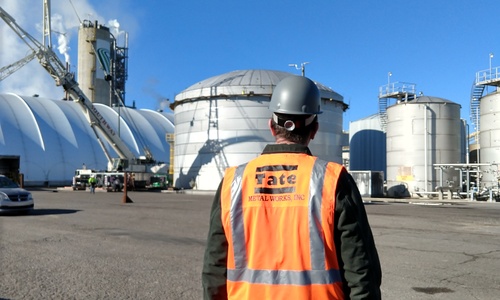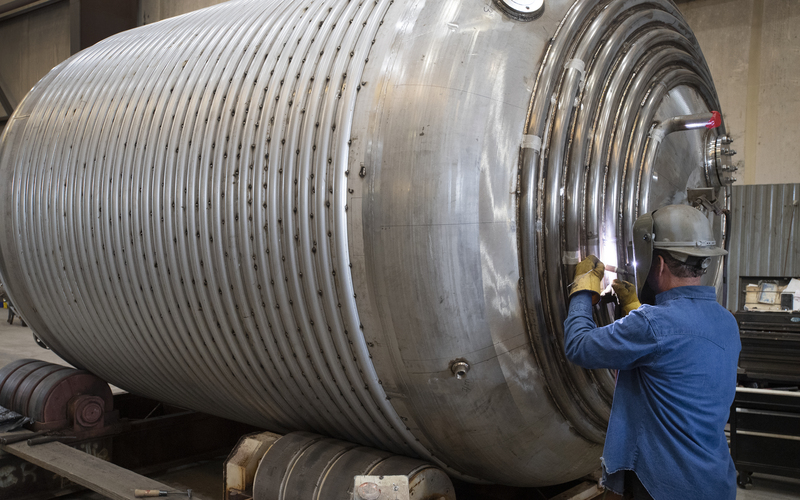Advanced Recycling of Plastics
At Tate Metalworks, we recognize the pivotal role that the recycling of plastics is playing in the circular economy and how the storage tanks and reactors we fabricate, and construct play a major part in the process and storage. Advanced recycling, also known as chemical or molecular recycling, is the practice of taking waste plastic and transforming it through depolymerisation, pyrolysis or methanolysis chemical processes back into raw polymer building blocks that can be used again as part of the circular economy.
Our tanks and pressure vessels are essential for transforming the plastic feedstocks, intermediate products and final outputs throughout various stages of the recycling process. Our expertise in designing, fabricating and erecting storage tanks and vessels complements the intricate nature of advanced recycling, ensuring seamless operations and optimal resource utilization.

Advanced Recycling Storage Tanks
Let's explore how storage tanks integrate into the advanced recycling process.
1. Feedstock Storage: Elevated storage silos serve as holding tanks for incoming plastic feedstocks awaiting processing. Whether it's post-consumer plastics collected from recycling programs or industrial plastic waste sourced from manufacturing facilities, our fabricated storage silos provide secure containment for plastic feedstocks while awaiting conversion through depolymerization, pyrolysis or other chemical processes.
2. Batch Reactors and Continuous Stirred Tank Reactors: These reactors are the most important part of advanced recycling. This is where the chemical reaction occurs that breaks down the plastic and returns it to its raw material. Tate Metalworks specializes in the engineering and design of ASME pressure vessels required for this process.
3. Intermediate Product Storage: During advanced recycling processes such as depolymerization or pyrolysis, various intermediate products are generated, including monomers, syngas and liquid fuels. Our storage tanks offer the capacity and flexibility to store these intermediate products temporarily before further refining or utilization. This ensures continuity in the recycling process and allows for efficient management of production flows.
4. Final Product Storage: Once the advanced recycling process is complete, the resulting products, such as recycled monomers, oils or gasses, need to be stored before being transported to downstream facilities or end users. Tate Metalworks' storage tanks are designed to meet the specific requirements of each product, ensuring compatibility, safety, and integrity during storage. Whether it's storing purified monomers for polymerization or syngas for energy generation, our tanks provide reliable containment and preservation.
5. Batch Processing and Mixing: In some advanced recycling operations, batch processing and mixing of feedstocks or intermediate products may be necessary to achieve desired compositions or reaction conditions. Our storage tanks can be equipped with mixing systems and other ancillary equipment to facilitate batch processing, ensuring homogeneity and consistency in chemical reactions.

Contact Us
By incorporating storage tanks into advanced recycling workflows, Tate Metalworks provides comprehensive solutions that support the efficient and sustainable management of plastic waste. Our commitment to quality, innovation, safety and environmental responsibility ensures that our storage tanks contribute to the advancement of advanced recycling and the transition towards a circular economy.
Contact us today to learn more about how our storage tanks can optimize your advanced recycling operations.
© 2025 Tate Metalworks. All Rights Reserved|
Privacy | Cookies |
Site by ALINE, A Marketing Company





 Tate serves clients Nationwide, from our Headquarters in the Upstate of South Carolina.
Tate serves clients Nationwide, from our Headquarters in the Upstate of South Carolina.